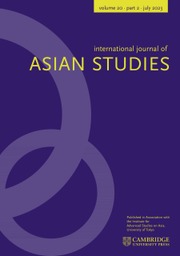Crossref Citations
This article has been cited by the following publications. This list is generated based on data provided by
Crossref.
Ashiwa, Yoshiko
and
Wank, David L.
2006.
The Politics of a Reviving Buddhist Temple: State, Association, and Religion in Southeast China.
The Journal of Asian Studies,
Vol. 65,
Issue. 2,
p.
337.
Fisher, Gareth
2008.
The Spiritual Land Rush: Merit and Morality in New Chinese Buddhist Temple Construction.
The Journal of Asian Studies,
Vol. 67,
Issue. 1,
p.
143.
Dy, Aristotle
2012.
Chinese Buddhism and ethnic identity in Catholic Philippines.
Contemporary Buddhism,
Vol. 13,
Issue. 2,
p.
241.
Nichols, Brian J.
2012.
The Wiley‐Blackwell Encyclopedia of Globalization.
Fisher, Gareth
2012.
Religion as Repertoire.
Modern China,
Vol. 38,
Issue. 3,
p.
346.
Chia, Jack Meng-Tat
2013.
A RECENT QUEST FOR RELIGIOUS ROOTS: THE REVIVAL OF THE GUANGZE ZUNWANG CULT AND ITS SINO-SOUTHEAST ASIAN NETWORKS, 1978–2009.
Journal of Chinese Religions,
Vol. 41,
Issue. 2,
p.
91.
Pieke, Frank N.
2014.
Anthropology, China, and the Chinese Century.
Annual Review of Anthropology,
Vol. 43,
Issue. 1,
p.
123.
Ji, Zhe
2014.
Buddhist Groups among Chinese Immigrants in France.
Review of Religion and Chinese Society,
Vol. 1,
Issue. 2,
p.
212.
Nichols, Brian J.
2017.
Taking Welch andThe Practice of Chinese Buddhisminto the 21st century.
Studies in Chinese Religions,
Vol. 3,
Issue. 3,
p.
258.
Klein, Jakob A.
2017.
Buddhist Vegetarian Restaurants and the Changing Meanings of Meat in Urban China.
Ethnos,
Vol. 82,
Issue. 2,
p.
252.
Ji, Zhe
2018.
Vers une mondialisation réflexive : les trajectoires et les tendances du bouddhisme chinois transnational.
Diogène,
Vol. n° 256,
Issue. 4,
p.
107.
Song, Zhifang
2019.
The Palgrave Handbook of Ethnicity.
p.
1.
Song, Zhifang
2019.
The Palgrave Handbook of Ethnicity.
p.
1167.
Liu, Jifeng
2020.
From vegetarian hall to revolutionary relic: Overseas Chinese and the reshaping of a Buddhist temple in a Chinese qiaoxiang.
History and Anthropology,
Vol. 31,
Issue. 5,
p.
583.
Chia, Jack Meng-Tat
2020.
Diaspora’s Dharma: Buddhist Connections across the South China Sea,1900–1949.
Contemporary Buddhism,
Vol. 21,
Issue. 1-2,
p.
33.
Lau, Ngar-sze
2021.
Teaching Transnational Buddhist Meditation with Vipassanā (Neiguan 內觀) and Mindfulness (Zhengnian 正念) for Healing Depression in Contemporary China.
Religions,
Vol. 12,
Issue. 3,
p.
212.
Shi, Xuefei
and
Li, Hangwei
2022.
Chinese Buddhism in Africa: The Entanglement of Religion, Politics and Diaspora.
Contemporary Buddhism,
Vol. 23,
Issue. 1-2,
p.
108.
Stapleton, Theo
and
Tao, Yu
2022.
The Emergence of Transcultural Humanistic Buddhism through the Lens of Religious Entrepreneurship.
Asian Studies Review,
Vol. 46,
Issue. 2,
p.
312.
Chiu, Tzu-Lung
2022.
When Mahāyāna Meets Theravāda: The Position of Chinese Bhikṣuṇīs in Contemporary Myanmar.
Religions,
Vol. 13,
Issue. 7,
p.
662.
Péronnet, Amandine
2022.
Embodying Legacy by Pursuing Asymmetry: Pushou Temple and Female Monastics’ Ordinations in Contemporary China.
Religions,
Vol. 13,
Issue. 10,
p.
1001.




